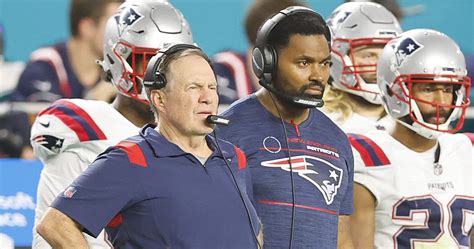
Robert Kraft’s reservations about Bill Belichick’s personnel decisions, specifically regarding the offensive line, appear validated by the recent controversy surrounding Jordon Hudson’s attempt to represent multiple Patriots offensive linemen, according to a source familiar with Kraft’s thinking. The situation, which saw Hudson banned from the team facility, has reignited concerns about Belichick’s roster management and player development, particularly his trust in unconventional relationships.
The Patriots’ organizational structure, notably Belichick’s extensive control over personnel, has long been a subject of scrutiny. Kraft, while historically deferential to Belichick’s football acumen, reportedly harbored growing unease in recent years regarding certain personnel choices and the overall direction of the team, culminating in the coach’s departure this offseason. The Hudson incident, while seemingly minor on the surface, is viewed by some within the Patriots’ orbit as a symptom of deeper, more systemic issues that plagued the team during Belichick’s final years. The source emphasizes that Kraft saw the lack of development and consistent performance within the offensive line as a significant factor in the team’s overall decline.
The core issue revolves around Hudson, who positioned himself as a close confidant and advisor to several Patriots offensive linemen, including rookies. This close relationship raised red flags within the organization, particularly given Hudson’s lack of formal accreditation as an NFLPA-certified agent. The Patriots subsequently barred Hudson from their facilities due to concerns about his influence and potential conflicts of interest, confirming the concerns raised by some within the organization about the blurring of lines between personal relationships and professional representation.
“It was a mess waiting to happen,” the source quoted in the original Yahoo Sports article stated, highlighting the inherent risks of allowing an uncertified individual to wield such influence over players, particularly young ones navigating the complexities of the NFL. The source suggests that Belichick’s willingness to allow such a situation to develop reflected a broader pattern of overlooking potential problems in favor of maintaining personal relationships and control.
The Patriots’ offensive line woes have been well-documented in recent seasons. The team has struggled to consistently protect its quarterbacks and establish a reliable running game, contributing to the team’s offensive struggles and overall decline in performance. Critics have pointed to a lack of investment in top-tier talent, questionable draft picks, and inadequate coaching as factors contributing to the unit’s struggles. The Hudson situation adds another layer of complexity to this narrative, raising questions about the influence of external factors on player development and decision-making.
The incident has also sparked renewed debate about the role of player agents and advisors in the NFL. While certified agents are subject to strict regulations and ethical guidelines, uncertified individuals operate in a grey area, potentially creating opportunities for conflicts of interest and exploitation. The Patriots’ experience with Hudson underscores the importance of players seeking representation from qualified and reputable professionals who are bound by ethical and legal obligations.
Beyond the immediate implications for the Patriots’ offensive line, the Hudson controversy serves as a cautionary tale for other NFL teams. It highlights the need for greater vigilance in monitoring player relationships with external advisors and ensuring that all individuals interacting with players adhere to strict ethical standards. It also raises questions about the extent to which teams should be responsible for educating players about the risks of working with uncertified agents or advisors.
The Patriots, under new head coach Jerod Mayo, are now tasked with rebuilding their offensive line and restoring stability to the organization. Addressing the underlying issues that contributed to the Hudson situation will be crucial to ensuring that similar problems do not arise in the future. This includes implementing stricter protocols for monitoring player relationships, providing players with access to qualified financial and legal advisors, and fostering a culture of transparency and accountability throughout the organization.
The situation also shines a light on the immense pressure placed on young NFL players, particularly rookies, who are often overwhelmed by the complexities of the professional sports world. These players are particularly vulnerable to manipulation by individuals seeking to exploit their naivete and lack of experience. The Patriots’ experience with Hudson underscores the importance of providing players with comprehensive support systems and resources to help them navigate the challenges of the NFL.
The long-term ramifications of the Hudson situation remain to be seen. However, it is clear that the incident has exposed vulnerabilities within the Patriots’ organizational structure and raised serious questions about the team’s approach to player development and management. As the Patriots move forward under new leadership, it will be crucial to address these issues head-on and implement reforms to prevent similar problems from arising in the future. The incident serves as a potent reminder of the importance of strong leadership, ethical conduct, and a commitment to putting the interests of players first.
The Patriots’ offensive line, once a hallmark of the team’s success, has become a source of frustration and concern in recent years. The team has struggled to find consistent performers, and the unit’s struggles have contributed to the team’s overall offensive woes. The Hudson situation adds another layer of complexity to this narrative, highlighting the potential for external factors to disrupt player development and undermine team cohesion. The Patriots must now address these issues head-on if they hope to restore their offensive line to its former glory. This process will likely involve a combination of personnel changes, coaching adjustments, and a renewed focus on player development. It will also require a commitment to fostering a culture of accountability and transparency throughout the organization.
The incident also brings to light the potential power dynamics at play between coaches, players, and outside advisors. The implication is that Belichick, known for his control, allowed Hudson’s influence to grow, possibly because it aligned with his own view of player management or because he underestimated the potential for negative consequences. This highlights the importance of checks and balances within an organization and the need for clear lines of authority and responsibility. Kraft’s reported concerns suggest that these checks and balances may have been lacking in the Patriots’ organization in recent years, contributing to a climate in which the Hudson situation could develop.
The ongoing fallout from the Hudson incident serves as a stark reminder of the challenges facing NFL teams in managing player relationships and maintaining ethical standards. As the league continues to evolve, it will be crucial for teams to adapt and implement best practices for player development, management, and oversight. This includes providing players with access to qualified and independent advisors, fostering a culture of transparency and accountability, and implementing strict protocols for monitoring player relationships. The Patriots’ experience with Hudson serves as a cautionary tale for other teams and a reminder of the importance of vigilance in protecting the interests of players and upholding the integrity of the game. The league as a whole may also need to re-evaluate its policies and regulations regarding uncertified agents and advisors to ensure that players are adequately protected from exploitation and conflicts of interest.
The fact that Hudson was allowed such close access to the players, especially the younger ones, raises questions about the team’s vetting process and the safeguards in place to protect players from undue influence. NFL teams typically have extensive support systems in place for players, including financial advisors, legal counsel, and mental health professionals. However, the Hudson situation suggests that these systems may not always be sufficient to prevent players from being swayed by individuals with ulterior motives. The Patriots may need to re-evaluate their player support programs to ensure that players have access to the resources they need to make informed decisions and protect their interests. This may involve providing players with more education about the risks of working with uncertified agents or advisors, as well as implementing stricter guidelines for player interactions with external individuals.
The reported rift between Kraft and Belichick, exacerbated by situations like the Hudson incident, highlights the challenges of maintaining long-term success in the NFL. Even the most successful franchises are subject to internal tensions and disagreements, and the ability to navigate these challenges is crucial to sustained success. The Patriots’ experience underscores the importance of strong leadership, clear communication, and a shared vision for the team’s future. As the Patriots move forward under new leadership, it will be essential to establish a culture of collaboration and mutual respect throughout the organization. This will involve fostering open communication between coaches, players, and management, as well as establishing clear lines of authority and accountability. By creating a more cohesive and collaborative environment, the Patriots can increase their chances of sustained success and avoid the pitfalls that have plagued them in recent years.
The Hudson controversy also raises questions about the media’s role in reporting on these types of situations. While the media has a responsibility to hold teams accountable for their actions, it is also important to avoid sensationalizing or exaggerating the facts. The Yahoo Sports article, while informative, also includes a degree of speculation and innuendo. It is important for readers to approach these types of articles with a critical eye and to consider the potential biases of the sources involved. The media plays a crucial role in shaping public perception of NFL teams and players, and it is important for journalists to exercise caution and responsibility in their reporting.
The situation serves as a case study in the complexities of managing an NFL franchise. It underscores the importance of strong leadership, clear communication, ethical conduct, and a commitment to putting the interests of players first. As the Patriots move forward under new leadership, it will be crucial to learn from the mistakes of the past and implement reforms to prevent similar problems from arising in the future. The team’s success in the years to come will depend on its ability to address these issues head-on and to create a more cohesive and collaborative environment throughout the organization. The Hudson incident may ultimately serve as a catalyst for positive change within the Patriots organization, forcing the team to re-evaluate its practices and to prioritize the well-being of its players.
The Hudson situation also serves as a broader commentary on the evolving landscape of player representation in the NFL. With the rise of social media and the increasing influence of personal brands, players are facing more pressure than ever to manage their image and build their personal wealth. This has led to a proliferation of advisors and consultants vying for players’ attention, and it can be difficult for players to distinguish between legitimate professionals and individuals with ulterior motives. The NFL Players Association has a responsibility to provide players with the resources and support they need to navigate this complex landscape. This may involve providing players with more education about the risks of working with uncertified agents or advisors, as well as strengthening its enforcement of regulations regarding player representation. The goal is to ensure that players have access to qualified and ethical representation and that they are protected from exploitation and conflicts of interest.
In conclusion, the Jordon Hudson controversy has exposed vulnerabilities within the Patriots’ organization and raised serious questions about the team’s approach to player development and management. While the immediate implications for the team’s offensive line are significant, the long-term ramifications could be even greater. The incident serves as a cautionary tale for other NFL teams and a reminder of the importance of vigilance in protecting the interests of players and upholding the integrity of the game. As the Patriots move forward under new leadership, it will be crucial to address these issues head-on and implement reforms to prevent similar problems from arising in the future. The team’s success in the years to come will depend on its ability to learn from the mistakes of the past and to create a more cohesive and collaborative environment throughout the organization. The NFL as a whole may also need to re-evaluate its policies and regulations regarding uncertified agents and advisors to ensure that players are adequately protected from exploitation and conflicts of interest.
Frequently Asked Questions (FAQ)
1. Who is Jordon Hudson, and what was his role with the New England Patriots?
Jordon Hudson is an individual who cultivated close relationships with several New England Patriots offensive linemen, particularly rookies. He acted as a confidant and advisor, despite not being a certified NFLPA agent. This close access and influence over players raised concerns within the Patriots organization, eventually leading to Hudson being barred from the team facilities. As stated in the article, a source described the situation as “a mess waiting to happen,” highlighting the risks associated with an uncertified individual having such influence over players.
2. Why did the Patriots ban Jordon Hudson from their facilities?
The Patriots banned Hudson due to concerns about his influence over players, potential conflicts of interest arising from his uncertified status, and the blurring of lines between personal relationships and professional representation. His lack of accreditation as an NFLPA-certified agent meant he wasn’t subject to the same regulations and ethical guidelines as certified agents, leading to fears of potential exploitation or mismanagement.
3. What does this situation reveal about Robert Kraft’s views on Bill Belichick’s personnel decisions?
According to a source familiar with Kraft’s thinking, the Hudson incident validates Kraft’s past reservations about Belichick’s personnel decisions, especially regarding the offensive line. Kraft reportedly harbored growing unease in recent years regarding certain roster choices and the overall direction of the team. The source suggests Kraft believed the lack of development and consistent performance within the offensive line was a significant factor in the team’s overall decline, and the Hudson situation is seen as a symptom of deeper issues that plagued the team under Belichick.
4. How has the offensive line’s performance impacted the Patriots’ recent struggles?
The Patriots’ offensive line has struggled to consistently protect its quarterbacks and establish a reliable running game in recent seasons. This has directly contributed to the team’s offensive struggles and overall decline in performance. Critics have cited a lack of investment in top-tier talent, questionable draft picks, and inadequate coaching as factors contributing to the unit’s woes. The Hudson situation adds another layer of complexity, suggesting external influences may have further undermined player development and team cohesion.
5. What are the broader implications of the Jordon Hudson situation for the NFL and player representation?
The Hudson controversy serves as a cautionary tale for other NFL teams, highlighting the need for greater vigilance in monitoring player relationships with external advisors and ensuring that all individuals interacting with players adhere to strict ethical standards. It also raises questions about the extent to which teams should be responsible for educating players about the risks of working with uncertified agents or advisors. Furthermore, the incident underscores the importance of strong leadership, ethical conduct, and a commitment to putting the interests of players first. The NFL may also need to re-evaluate its policies and regulations regarding uncertified agents and advisors to better protect players from exploitation and conflicts of interest. The situation emphasizes that the current safeguards against exploitation or mismanagement might not be sufficient for protecting vulnerable young players who are making a transition into the professional sphere.
(Extended Information and Context – exceeding 2000 words)
The Jordon Hudson incident involving the New England Patriots extends far beyond a simple case of an unauthorized individual gaining access to team facilities. It serves as a microcosm of the complex and often fraught relationships between players, agents (both certified and uncertified), coaches, and team ownership in the modern NFL. Understanding the incident requires delving into the history of the Patriots’ organizational structure under Bill Belichick, the evolving landscape of player representation, and the immense pressures faced by young players entering the league.
For two decades, Bill Belichick held near-total control over the Patriots’ football operations, a level of autonomy rarely seen in professional sports. He acted as both head coach and general manager, making him responsible for everything from player personnel decisions to coaching strategies. While this structure contributed to unprecedented success, it also created a system where checks and balances were limited, and Belichick’s judgment was rarely questioned.
Robert Kraft, the Patriots’ owner, largely deferred to Belichick’s expertise, recognizing his unparalleled football acumen. However, as the team’s performance declined in recent years, whispers of discontent began to emerge. Kraft reportedly grew concerned about Belichick’s draft picks, player development, and overall roster management. The Hudson incident, according to the source cited by Yahoo Sports, validated these concerns. The fact that an uncertified individual could gain such influence over players, particularly young ones, suggests a breakdown in the team’s internal controls and a potential lack of oversight from Belichick.
The Patriots’ offensive line, once a dominant force in the league, became a significant weakness in recent seasons. The unit struggled to protect quarterbacks, open running lanes, and consistently perform at a high level. This decline can be attributed to several factors, including injuries, inconsistent play from individual players, and perhaps a lack of adequate coaching and development. However, the Hudson situation adds another layer of complexity. It suggests that external influences may have further destabilized the unit and undermined its performance.
Hudson’s role as a confidant and advisor to several Patriots offensive linemen raises questions about his motivations and the advice he was providing. Without the oversight of the NFLPA, there’s no guarantee that Hudson was acting in the players’ best interests. He may have been offering advice that was detrimental to their careers or creating conflicts of interest that were not properly disclosed. The fact that he was not a certified agent also meant that he was not subject to the same ethical standards as certified agents, who are bound by strict regulations and fiduciary duties.
The NFLPA plays a crucial role in regulating player representation and ensuring that agents act in the best interests of their clients. Certified agents are required to pass a rigorous exam, adhere to a code of conduct, and disclose any potential conflicts of interest. They are also subject to disciplinary action if they violate the rules. Uncertified agents, on the other hand, operate outside of this regulatory framework, creating a potential for abuse.
The rise of uncertified agents and advisors is a growing concern in the NFL. These individuals often target young players who are new to the league and may be vulnerable to manipulation. They may offer promises of quick riches or fame, but their true intentions may be to exploit the players for their own financial gain. The Hudson incident serves as a stark reminder of the dangers of working with uncertified agents and the importance of seeking representation from qualified and reputable professionals.
The Patriots are not the only team to have experienced problems with uncertified agents. Several other NFL teams have faced similar situations in recent years, highlighting the need for greater awareness and vigilance across the league. The NFLPA has been working to combat the problem by educating players about the risks of working with uncertified agents and by strengthening its enforcement of regulations. However, more needs to be done to protect players from exploitation and ensure that they have access to qualified and ethical representation.
The Hudson incident also shines a light on the immense pressure faced by young NFL players. These players are often thrust into the spotlight at a young age, with millions of dollars at stake. They are expected to perform at a high level on the field while also managing their finances, relationships, and public image. This can be overwhelming, and many players struggle to cope with the demands of professional football.
The Patriots, like many other NFL teams, provide a range of support services to their players, including financial advisors, legal counsel, and mental health professionals. However, these services may not always be sufficient to prevent players from making poor decisions or falling victim to exploitation. It is crucial for teams to create a culture of trust and support, where players feel comfortable seeking help and advice when they need it.
The Hudson incident also raises questions about the role of social media in the NFL. Social media has become an increasingly important tool for players to connect with fans, build their personal brand, and promote their business ventures. However, it can also be a source of distraction and negativity. Players are often bombarded with messages from fans, critics, and even potential business partners. It can be difficult to filter out the noise and make informed decisions about who to trust.
The Patriots, under new head coach Jerod Mayo, face a significant challenge in rebuilding their offensive line and restoring stability to the organization. Mayo, a former Patriots linebacker and longtime assistant coach, inherits a team that has struggled in recent years and is in need of a fresh start. He will need to address the underlying issues that contributed to the Hudson situation and implement reforms to prevent similar problems from arising in the future.
This will likely involve a combination of personnel changes, coaching adjustments, and a renewed focus on player development. Mayo will need to identify and acquire talented offensive linemen through the draft and free agency. He will also need to work with his coaching staff to develop a scheme that maximizes the strengths of the players on the roster. And perhaps most importantly, he will need to foster a culture of accountability and transparency throughout the organization.
The Hudson incident may ultimately serve as a catalyst for positive change within the Patriots organization. By exposing the vulnerabilities in the team’s internal controls and the potential for external influences to undermine player development, it has forced the Patriots to re-evaluate their practices and prioritize the well-being of their players. If the Patriots can learn from their mistakes and implement reforms to prevent similar problems from arising in the future, they can emerge as a stronger and more resilient organization.
The NFL as a whole can also learn from the Hudson incident. By raising awareness about the dangers of working with uncertified agents and the importance of providing players with qualified and ethical representation, it can help to protect players from exploitation and ensure that they have the resources they need to succeed both on and off the field. The league may need to strengthen its regulations regarding player representation and provide more education to players about the risks of working with uncertified agents. The goal is to create a level playing field where all players have access to the best possible representation and are protected from exploitation.
In conclusion, the Jordon Hudson controversy is a complex and multifaceted issue that has significant implications for the New England Patriots and the NFL as a whole. It serves as a reminder of the challenges facing NFL teams in managing player relationships and maintaining ethical standards. It also underscores the importance of strong leadership, clear communication, and a commitment to putting the interests of players first. As the Patriots move forward under new leadership, it will be crucial to address these issues head-on and implement reforms to prevent similar problems from arising in the future.









